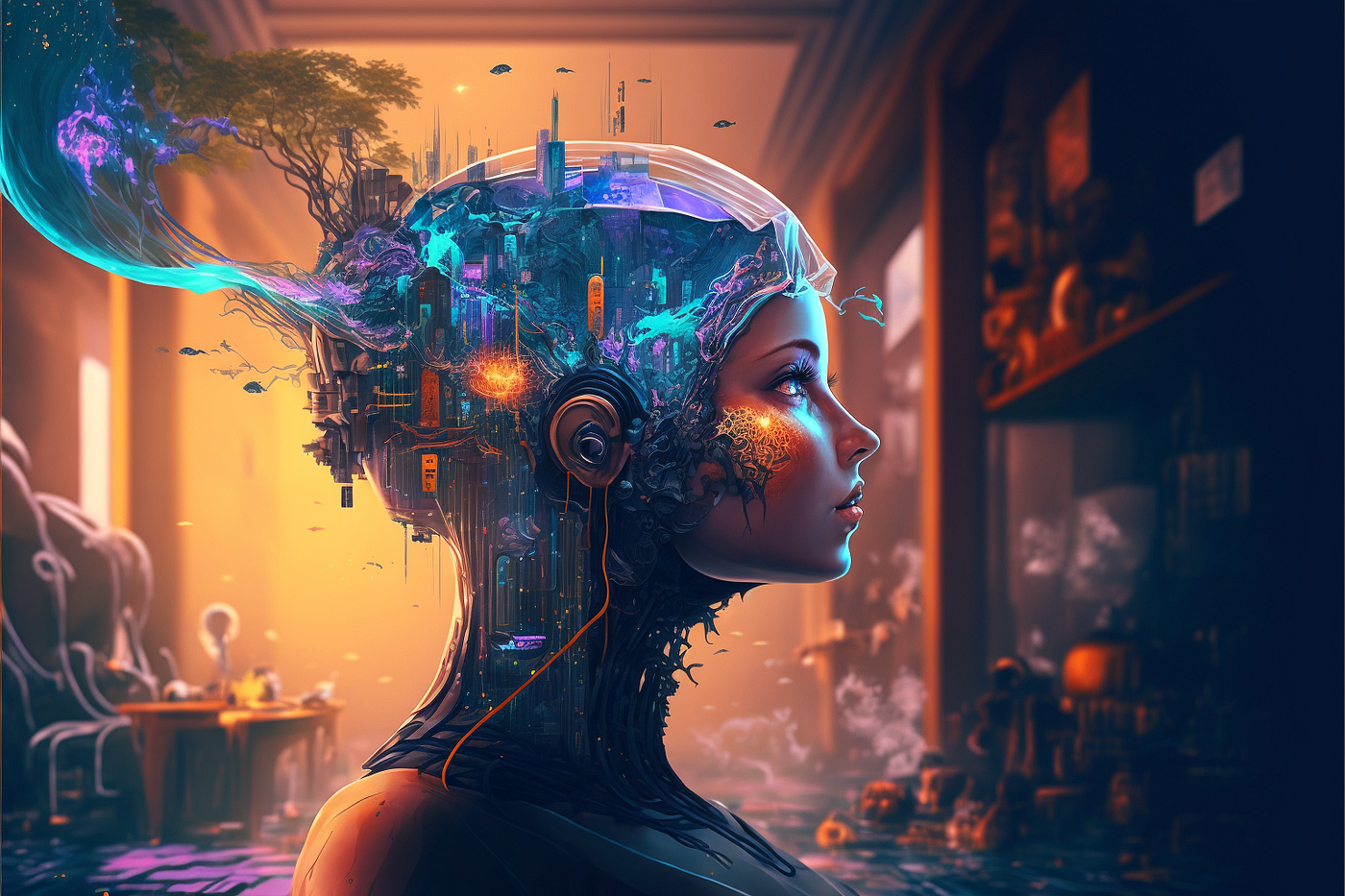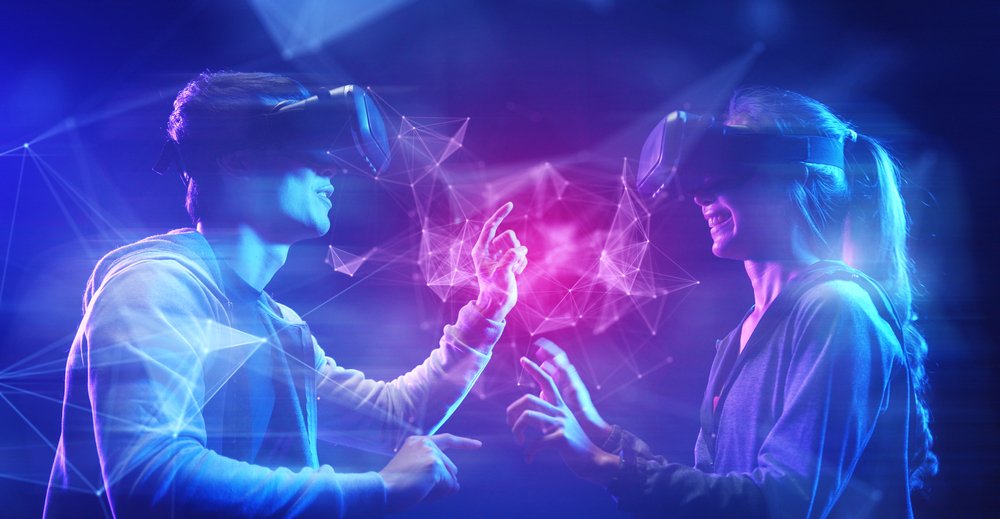The Future Of AI In The Metaverse

Imagine a world where artificial intelligence and virtual reality seamlessly merge, creating a dynamic and immersive environment known as the metaverse. In this exciting futuristic realm, AI takes center stage, enhancing our virtual experiences, and revolutionizing the way we interact with technology. Embark on a journey as we explore the limitless potential of AI in the metaverse, and uncover the possibilities that lie ahead.

This image is property of miro.medium.com.
Artificial Intelligence in the Metaverse
The metaverse, a virtual reality space where users can interact with a computer-generated environment and other users, is becoming increasingly popular. With the rise of virtual reality and augmented reality technologies, the metaverse offers a whole new realm of possibilities for entertainment, communication, and commerce. One of the key technologies that is driving the development of the metaverse is artificial intelligence (AI). AI has the potential to enhance virtual environments, provide personalized experiences, and power virtual avatars, among many other applications. In this article, we will explore the role of AI in the metaverse, its applications, challenges, and limitations, as well as its potential impact on industries and society.
1. Introduction to the Metaverse
Before delving into the role of AI in the metaverse, let’s provide a brief introduction to what the metaverse actually is. The term “metaverse” refers to an interconnected network of virtual worlds that enable users to engage in shared experiences. It is essentially a frontier of digital spaces that can be accessed through various platforms such as virtual reality headsets, augmented reality glasses, or even traditional computer screens. The metaverse offers a vast and immersive environment where users can interact with each other, explore virtual landscapes, and create their own digital identities. Now, let’s dive into how AI is shaping this virtual landscape.

This image is property of datafloq.com.
2. Role of AI in the Metaverse
2.1 Enhancing Virtual Environments
AI plays a crucial role in enhancing the realism and interactivity of virtual environments in the metaverse. With AI-powered algorithms and computational capabilities, virtual worlds can simulate realistic physics, dynamic weather patterns, and lifelike characters. This enables users to have a more immersive and engaging experience within the metaverse. AI algorithms can also improve the rendering and graphics quality, making the virtual environments visually impressive and believable. Additionally, AI can help in creating vast and procedurally generated virtual landscapes, ensuring that the metaverse remains diverse and constantly evolving.
2.2 Personalized Experiences
One of the most promising aspects of AI in the metaverse is its ability to provide personalized experiences for each user. AI algorithms can analyze a user’s behavior, preferences, and interactions within the virtual environment to create tailored content and interactions. For example, an AI-powered system can learn your gaming preferences and adapt the difficulty level of a game accordingly, ensuring that you have an enjoyable and challenging experience. Similarly, AI can personalize recommendations for virtual events, virtual marketplaces, and social interactions, making the metaverse feel more tailored to individual users.
2.3 AI-powered Avatars
In the metaverse, users can create digital representations of themselves called avatars. These avatars allow users to navigate and interact within the virtual space. AI is revolutionizing the capabilities of avatars by enabling them to exhibit more human-like behavior and intelligence. AI-powered avatars can understand natural language, express emotions, and engage in meaningful conversations with users. This opens up a whole new dimension of social interaction within the metaverse, allowing users to have realistic and engaging conversations with AI-powered entities.
3. Applications of AI in the Metaverse
3.1 Virtual Assistant and Concierge Services
AI-powered virtual assistants and concierge services are becoming an integral part of the metaverse experience. Virtual assistants like Siri, Alexa, or Cortana can be integrated into the metaverse to help users navigate, find information, and perform tasks. They can answer questions, provide recommendations, and even perform virtual shopping on behalf of users. These AI-powered virtual assistants make the metaverse more accessible and user-friendly, enabling users to get assistance and support in real-time.
3.2 Advertising and Marketing
AI has a significant impact on advertising and marketing in the metaverse. With user data analysis and AI algorithms, companies can provide personalized advertisements and recommendations to users based on their preferences and behaviors. This targeted advertising approach ensures that users receive relevant and engaging advertisements, increasing the effectiveness of marketing campaigns. Additionally, AI can analyze user engagement and response to advertisements, optimizing marketing strategies and improving the return on investment for businesses operating in the metaverse.
3.3 Content Generation and Curation
AI can also play a key role in content generation and curation within the metaverse. AI algorithms can generate synthetic content, such as virtual objects, landscapes, and even entire virtual worlds. This enables the metaverse to continually expand and innovate, offering users new and exciting experiences. Furthermore, AI algorithms can curate and recommend content to users based on their interests, ensuring they are exposed to content that aligns with their preferences. AI-powered content generation and curation bring diversity and dynamism to the metaverse, enhancing the overall user experience.

This image is property of www.datanami.com.
4. Challenges and Limitations
While AI offers immense potential for the metaverse, there are several challenges and limitations that need to be addressed.
4.1 Privacy and Security Concerns
As AI collects and analyzes user data within the metaverse, there are significant privacy and security concerns. Users may have reservations about their personal information being collected and used for targeted advertising or other purposes. It is crucial for developers and policymakers to establish robust privacy frameworks and security measures to protect user data in the metaverse.
4.2 Ethical Considerations
AI in the metaverse raises ethical considerations regarding the use of AI algorithms to manipulate user behavior or push certain narratives. Developers and stakeholders must ensure that AI algorithms are designed and deployed ethically, respecting user autonomy and avoiding undue influence.
4.3 Bias and Fairness Issues
AI algorithms can inadvertently inherit biases present in the data they are trained on, leading to discriminatory outcomes or perpetuating existing societal biases. It is essential to address bias and fairness issues in AI systems to ensure that the metaverse remains inclusive and fair for all users.
5. Future Trends and Possibilities
As AI technology continues to advance, several future trends and possibilities emerge for AI in the metaverse.
5.1 Integration of AI with VR and AR
The integration of AI with virtual reality and augmented reality technologies holds immense potential for the metaverse. AI algorithms can enhance the realism and interactivity of virtual and augmented environments, creating more immersive and engaging experiences for users.
5.2 Cognitive Computing in the Metaverse
Cognitive computing, which involves AI systems that can reason, learn, and understand natural language, can bring about significant advancements in the metaverse. AI systems that can understand and respond to complex user queries and engage in natural language conversations can revolutionize the way we interact with the metaverse.
5.3 AI Agents for Social Interaction
AI-powered agents that can act as social companions or virtual friends within the metaverse have the potential to enhance social interactions and combat the loneliness that can occur in virtual environments. These AI agents can learn from user interactions, develop personalities, and provide companionship to users, making the metaverse a more social and fulfilling experience.

This image is property of imageio.forbes.com.
6. Impact on Industries and Society
AI in the metaverse has the potential to transform various industries and society as a whole.
6.1 Education and Training
In the metaverse, AI-powered virtual assistants and tutors can support personalized learning experiences, providing tailored content and guidance to individual learners. Virtual classrooms, simulations, and interactive learning environments can be enhanced by AI, creating immersive and effective educational experiences.
6.2 Healthcare and Telemedicine
AI can play a significant role in healthcare and telemedicine within the metaverse. AI-powered virtual doctors or nurses can assist patients, provide medical advice, and monitor their health remotely. Virtual reality simulations can also be used for surgical training or therapeutic interventions, improving healthcare outcomes.
6.3 Entertainment and Gaming
The entertainment and gaming industry stands to benefit greatly from AI in the metaverse. AI-powered characters and virtual actors can provide more realistic and engaging storytelling experiences. AI algorithms can also create dynamic and responsive game environments, ensuring that games adapt to the player’s skills and preferences.
7. Collaborations and Partnerships
To fully harness the potential of AI in the metaverse, collaborations and partnerships between different stakeholders are crucial.
7.1 Tech Companies and AI Startups
Tech companies and AI startups play a vital role in developing AI technologies and solutions for the metaverse. Collaborations between these entities can drive innovation, ensuring the continuous improvement and evolution of AI in the metaverse.
7.2 Academic and Research Institutions
Academic and research institutions contribute to the advancement of AI in the metaverse through cutting-edge research and development. Collaborations between these institutions and industry players can foster knowledge exchange, drive breakthroughs, and address challenges related to AI in the metaverse.
7.3 Cross-industry Collaborations
Cross-industry collaborations between technology companies, entertainment companies, healthcare providers, and other sectors can promote the integration of AI into various aspects of the metaverse. These collaborations can lead to the creation of innovative and transformative experiences within the metaverse.

This image is property of venturebeat.com.
8. Regulations and Governance
The development and deployment of AI in the metaverse require proper regulations and governance to ensure responsible and ethical use of the technology.
8.1 Policy Frameworks and Standards
Policymakers need to establish policy frameworks and standards that address the ethical, legal, and societal implications of AI in the metaverse. These frameworks can guide the development and deployment of AI technologies, ensuring user protection and promoting fairness.
8.2 Government Oversight and Accountability
Governments should establish oversight mechanisms to ensure proper governance and accountability in the metaverse. This can include monitoring the use of AI algorithms, enforcing privacy regulations, and addressing any issues related to bias or discriminatory outcomes.
8.3 International Cooperation
Given the global nature of the metaverse, international cooperation and collaboration are essential for establishing consistent regulations and governance frameworks. Governments, organizations, and industry players need to work together to address the cross-border challenges associated with AI in the metaverse.
9. Conclusion
In conclusion, AI is poised to revolutionize the metaverse, making it a more immersive, interactive, and personalized digital realm. Through enhancing virtual environments, providing personalized experiences, and powering AI avatars, AI has the potential to transform the way we interact with the metaverse. However, while the possibilities are exciting, it is important to address the challenges and limitations related to privacy, ethics, bias, and governance. By fostering collaborations, establishing regulations, and ensuring responsible deployment of AI, we can unlock the full potential of AI in the metaverse and create a digital landscape that benefits industries and society as a whole.






